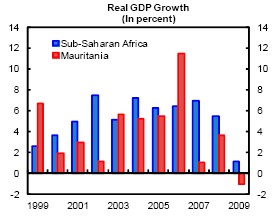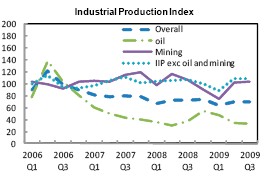|
Mauritania Economy - Development More optimistic outlook for Mauritania
Last year, the Mauritanian economy shrank by 1.1 percent - or 0.9 percent if the oil sector is excluded. For this year, the International Monetary Fund (IMF) expected only a slow recovery late last year.
Mauritania's troubled oil production, which rapidly peaked in 2006 and since then has failed to see projects reaching their full potentials, is continuing to decline and thus negatively affecting total GDP growth. Oil production last year was estimated at around 10,700 barrels per day last year, down from 75,000 in the peak year, 2006. Production is projected at only 7,500 barrels this year. The Fund, leaning on Mauritanian government data, expects this low level to be maintained for at least three years, before a new growth may again be possible. "This drastic shift in production has led to a significant revision in the macroeconomic outlook of the country, the downsizing of the public investment program, and the need for more external aid which was curtailed at the onset of the oil economy," IMF analysts commented on Mauritania's declining oil production earlier this year. Meanwhile, efforts to reduce poverty in Mauritania are believed to have been affected negatively by the 2009 crisis. Poverty incidence had declined from 51 percent in 2000 to about 42 percent in 2008, according to the IMF. No newer numbers exists, but the crisis in combination with a current drought may have increased the poverty incidence rate since 2008. Mauritanian authorities, despite a reduced revenue basis in 2009, however struggled to protect social spending over the budget, even finding IMF acceptance for a fiscal deficit. By staff writer © afrol News - Create an e-mail alert for Mauritania news - Create an e-mail alert for Economy - Development news
On the Afrol News front page now
|
front page
| news
| countries
| archive
| currencies
| news alerts login
| about afrol News
| contact
| advertise
| español
©
afrol News.
Reproducing or buying afrol News' articles.
You can contact us at mail@afrol.com









